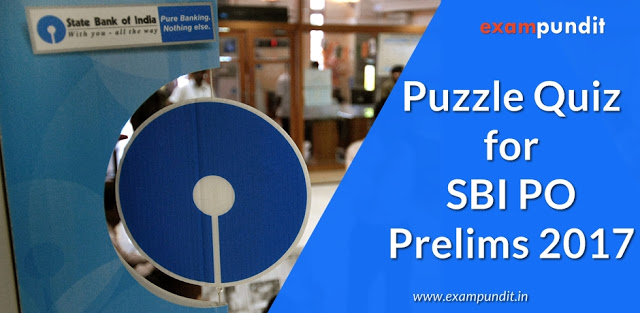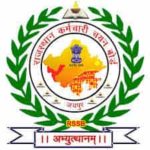

Hello and welcome to exampundit. Here is a set of Puzzle Quiz for SBI PO Prelims 2017.
Directions for
Questions 1 to 7: Study the
following information carefully and answer the questions given below:
Questions 1 to 7: Study the
following information carefully and answer the questions given below:
Six plays A, B, C, D, E and F are
to be staged starting from Monday and ending on Sunday with one of the days
being an off day, not necessarily in the same order, Each of the plays has
different time duration: ½ hour, 1 hour, 1 ½ hours, 2 hours, 2 ½ hours and 3
hours, again not necessarily in the same order. Sunday is not an off day and a
Play of ½ hour duration is staged on that day. Play A is staged immediately
before Play E. There are two plays staged between Play F which is for 3 hours
and Play C which is for 1 ½ hours. The off day is after the staging of Play E
and there are two days between the off day and Play A. Play D which is for 2
hours is not staged on Monday. The play staged immediately before the off day
is of 3 hours. Play A is for less than 2 ½ hours.
to be staged starting from Monday and ending on Sunday with one of the days
being an off day, not necessarily in the same order, Each of the plays has
different time duration: ½ hour, 1 hour, 1 ½ hours, 2 hours, 2 ½ hours and 3
hours, again not necessarily in the same order. Sunday is not an off day and a
Play of ½ hour duration is staged on that day. Play A is staged immediately
before Play E. There are two plays staged between Play F which is for 3 hours
and Play C which is for 1 ½ hours. The off day is after the staging of Play E
and there are two days between the off day and Play A. Play D which is for 2
hours is not staged on Monday. The play staged immediately before the off day
is of 3 hours. Play A is for less than 2 ½ hours.
1. What is the time duration of Play B?
1) 2 ½ hours
2) 2 hours
3) 1 hour
4) ½ hour
5) None of these
2. Which day is the off day?
1) Tuesday
2) Monday
3) Friday
4) Saturday
5) Cannot be determined
3. Which of the following combinations of Play – Day – Time
Duration is correct ?
Duration is correct ?
1) E – Wednesday – 2 hours
2) A – Tuesday – 1 hour
3) C – Thursday – 1 ½ hours
4) F – Tuesday – 3 hours
5) None is correct
4. On which day is Play D staged?
1) Wednesday
2) Saturday
3) Tuesday
4) Friday
5) Cannot be determined
5. How many plays are staged before the off day?
1) Two
2) One
3) Five
4) Three
5) None of these
Directions (Q. 6-7):
Keeping all the other information the same, if D is staged on Monday, then ________.
Keeping all the other information the same, if D is staged on Monday, then ________.
6. A play of what time duration would be staged on Thursday?
1) 2 hours
2) 2 ½ hours
3) 1 hour
4) 3 hours
5) Cannot be determined
7. Which day would be the off day?
1) Tuesday
2) Monday
3) Friday
4) Saturday
5) None
Directions for Questions 8 to 10: Answer the questions on the basis
of the data given below.
of the data given below.
Five colleges, P, Q, R, S and T,
participated in an intercollegiate tournament comprising five events: Swimming,
Running, Cycling, Discus Throw and Horse Riding. In each of the events of this
tournament, the top 3 colleges were awarded a gold, a silver and a bronze
medal. Shamik, one of the spectators, recalled the following information. i.
Each college won at least one medal but not more than two medals of the same
type, i.e., no college won more than two gold medals, more than two silver
medals, or more than two bronze medals. ii. College Q won gold medals in two
games, in which college P won bronze medals. iii. College T won a gold and a
silver medal but not a single bronze medal. iv. Only R won 4 medals, the
highest number of medals won by any college. v. R, S and Q won a gold, silver
and a bronze medal respectively in Discus Throw. vi. P and S won a gold and a
silver medal re spectively in Swimming.
participated in an intercollegiate tournament comprising five events: Swimming,
Running, Cycling, Discus Throw and Horse Riding. In each of the events of this
tournament, the top 3 colleges were awarded a gold, a silver and a bronze
medal. Shamik, one of the spectators, recalled the following information. i.
Each college won at least one medal but not more than two medals of the same
type, i.e., no college won more than two gold medals, more than two silver
medals, or more than two bronze medals. ii. College Q won gold medals in two
games, in which college P won bronze medals. iii. College T won a gold and a
silver medal but not a single bronze medal. iv. Only R won 4 medals, the
highest number of medals won by any college. v. R, S and Q won a gold, silver
and a bronze medal respectively in Discus Throw. vi. P and S won a gold and a
silver medal re spectively in Swimming.
8. How many bronze medals did college R win in these five
events?
events?
1) 0
2) 1
3) 2
4) 3
5) Cannot be determined
9. If college T won a gold in Running and a silver in
Cycling, who won a bronze in Horse Riding?
Cycling, who won a bronze in Horse Riding?
1) Q
2) P
3) R
4) S
5) None of these
10. Which of the following colleges, won a silver medal in
Running? (Refer to the data in previous question)
Running? (Refer to the data in previous question)
1) R
2) P
3) Q
4) S
5) Cannot be determined
Answers & Solutions:
- 4
- 3
- 2
- 2
- 5
- 2
- 4
- 2
- 2
- 1
1-7:
8-10:
Swimming-S, Running-R, Cycling-C,
Discus Throw-D and Horse Riding-H From (ii), (v) and (vi), Q won 2 gold medals
but not in S or D. From (iii), T won gold in one from among R or C while T did
not win silver in S or D.
Discus Throw-D and Horse Riding-H From (ii), (v) and (vi), Q won 2 gold medals
but not in S or D. From (iii), T won gold in one from among R or C while T did
not win silver in S or D.
From (i), S did not win silver in those events in
which Q won gold medals. Hence, S did not win any medals in those events.
which Q won gold medals. Hence, S did not win any medals in those events.
From
(iv), R won 4 medals and the other colleges won 3 or less medals. So, the
medals won by the remaining 4 colleges are 3, 3, 3 and 2. T has won 2 medals
(i.e., 1 gold and 1 silver (using iii). P has won 3 medals.
(iv), R won 4 medals and the other colleges won 3 or less medals. So, the
medals won by the remaining 4 colleges are 3, 3, 3 and 2. T has won 2 medals
(i.e., 1 gold and 1 silver (using iii). P has won 3 medals.
So, it must have
won 1 gold in silver and 2 bronze in two from among R, C and H. The gold medals
are exhausted as P-1, Q-2, R-1, T-1, S can win 3 medals: 2 silver and 1 bronze.
Q has won 3 medals: 2 gold among from R, C and H, and 1 bronze. R won 4 medals:
bronze in S, gold in D and 2 silver.
won 1 gold in silver and 2 bronze in two from among R, C and H. The gold medals
are exhausted as P-1, Q-2, R-1, T-1, S can win 3 medals: 2 silver and 1 bronze.
Q has won 3 medals: 2 gold among from R, C and H, and 1 bronze. R won 4 medals:
bronze in S, gold in D and 2 silver.
Medal-winning combinations are:
ep
Recommended Test Series
Sponsored
(adsbygoogle = window.adsbygoogle || []).push({});
Regards
Team ExamPundit
This post was last modified on June 2, 2019 12:16 pm



